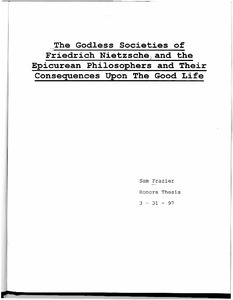| dc.rights.license | In Copyright | en_US |
| dc.creator | Frazier, Sam | |
| dc.date.accessioned | 2023-10-20T17:39:58Z | |
| dc.date.available | 2023-10-20T17:39:58Z | |
| dc.date.created | 1997 | |
| dc.identifier | WLURG038_Frazier_thesis_1997 | |
| dc.identifier.uri | https://dspace.wlu.edu/handle/11021/36314 | |
| dc.description.abstract | When one first encounters their works, the Epicurean philosophers and Friedrich Nietzsche appear to have a great deal in common. Their physics and conception of the universe seem
quite similar and both reach the conclusion that this world, our world, is all that man has. There is no possibility, then, of an afterlife of any sort. Accordingly, both philosophies make
enemies of religion. Having only this one world, both schools of thought consider man free from restraint and able to live truly and fully in this world. The issue then becomes what one ought to do, and thus an ethics is formed out of a concern for this world. Such is the good life of each philosophy, a consideration of what one can do and what one ought to do. What is striking is that
Nietzsche and the Epicureans espouse lives that are nearly exact opposites. The Epicureans believe in a simple, uncomplicated, and peaceful life. Nietzsche, on the other hand, extols the virtue of a risk-taking and adventurous life. In my analysis of these philosophies I hope to show: 1) that an ethical system can be formed out of a godless environment, 2) how each of these two
philosophies achieves this, 3) how such divergent prescriptions can come from a seemingly common starting point, and 4) which philosophy's good life has a greater claim to truth. [From introductory section] | en_US |
| dc.format.extent | 57 pages | en_US |
| dc.language.iso | en_US | en_US |
| dc.rights | This material is made available for use in research, teaching, and private study, pursuant to U.S. Copyright law. The user assumes full responsibility for any use of the materials, including but not limited to, infringement of copyright and publication rights of reproduced materials. Any materials used should be fully credited with the source. | en_US |
| dc.rights.uri | http://rightsstatements.org/vocab/InC/1.0/ | en_US |
| dc.title | The Godless Societies of Friedrich Nietzsche and the Epicurean Philosophers and Their Consequences Upon The Good Life | en_US |
| dc.type | Text | en_US |
| dcterms.isPartOf | WLURG038 - Student Papers | en_US |
| dc.rights.holder | Frazier, Sam | en_US |
| dc.subject.fast | Nietzsche, Friedrich Wilhelm, 1844-1900 | en_US |
| dc.subject.fast | Epicureans (Greek philosophy) | en_US |
